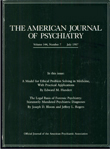New Mnemonic Tool for DSM-IV Diagnosis
TO THE EDITOR: I wish to propose a mnemonic tool that can assist clinicians in the rapid and systematic recall of the 17 different categories of psychiatric diagnosis in DSM-IV. As a firm adherent of both comprehensive differential diagnostic reasoning and biopsychosocial case formulation, I have found this tool useful for teaching students and residents, and especially for preparing candidates for Board examinations.
The 17 diagnostic categories can be easily recalled by imagining that one is examining—say, a sad patient—not only by means of one's psychodynamic acumen and empathic resonance, but also by deploying one's “DSM-IV-scope.” Let us call this patient either Samuel or Samantha. Thus, a mnemonic phrase that captures the (current) universe of descriptive diagnostic possibilities is “DSM-F-SCOPE: SAM IS SAD,” with each letter representing a major diagnostic category, as follows:
D —Delirium, dementia, and amnestic and other cognitive disorders
S —Substance-related disorders
M —Mood disorders
F —Factitious disorders
S —Schizophrenia and other psychotic disorders
C —Childhood, infancy, and adolescent disorders
O —Other disorders that may be a focus of clinical attention
P —Personality disorders
E —Eating disorders
S —Somatoform disorders
A —Anxiety disorders
M —Mental disorders due to general medical condition
I —Impulse control disorders not elsewhere classified
S —Sleep disorders
S —Sexual and gender identity disorders
A —Adjustment disorders
D —Dissociative disorders
I hope that others find this to be a user-friendly tool that enhances the likelihood of comprehensive diagnostic assessment.



